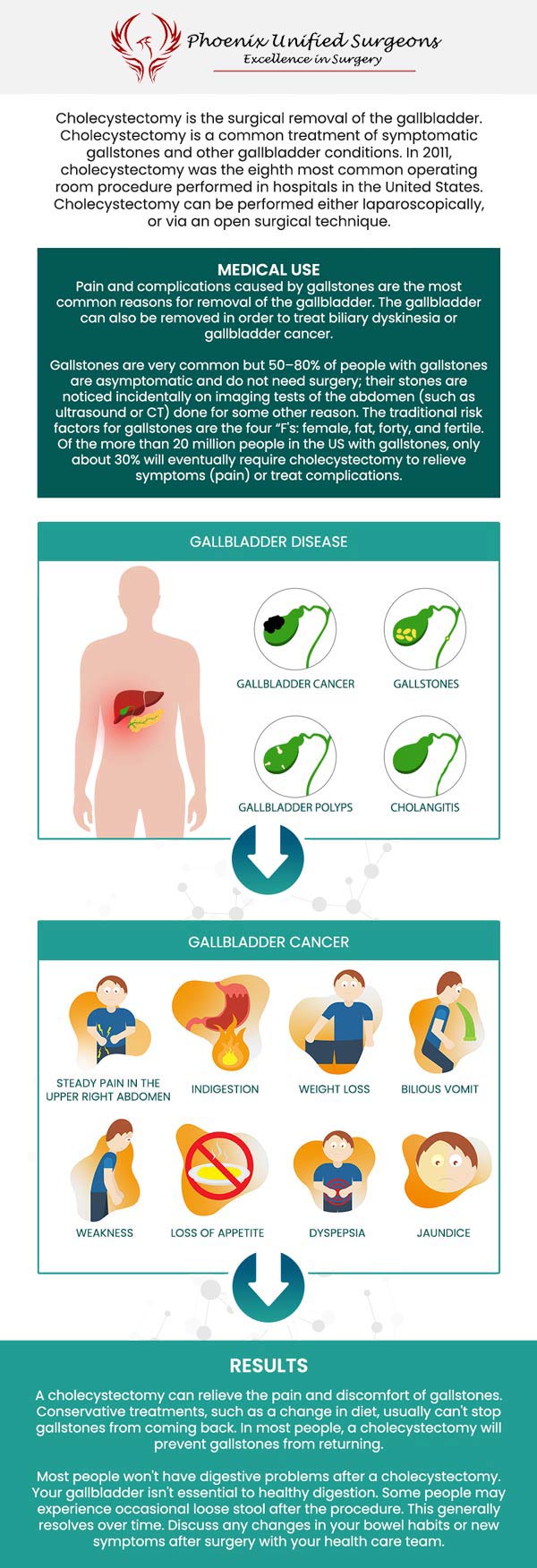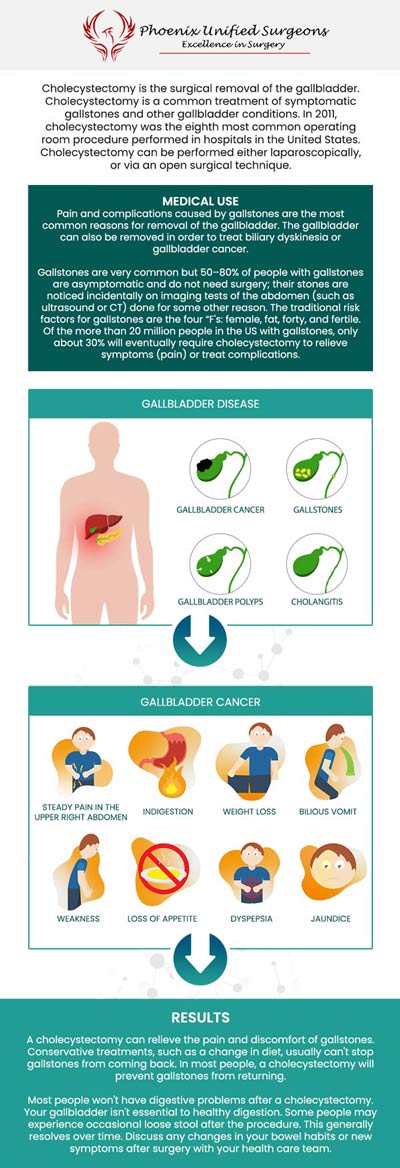Gallbladder Surgery Specialist in Phoenix, AZ
Gallbladder surgery is performed due to gallstones causing symptoms such as abdominal pain, nausea, vomiting, and jaundice. Other reasons for gallbladder surgery include inflammation of the gallbladder (cholecystitis), gallbladder polyps, biliary dyskinesia (impaired gallbladder function), and complications such as pancreatitis or cholangitis resulting from gallstones. See Dr. Debora J. Fox-McClary, M.D., MBA, FACS, FASCRS, Dr. Antonino Cammarata D.O., and Dr. J. Brian Brizendine, M.D., for gallbladder surgery to address persistent gallbladder problems and enhance your general quality of life. We are conveniently located at 20333 N 19th Avenue, Ste 230 Phoenix, AZ 85027. For more information, contact us or request an appointment online.




Table of Contents:
What are the first signs of a bad gallbladder?
Is gallbladder surgery a major operation?
How long is a typical recovery from gallbladder surgery?
How does life change after gallbladder removal?
Your gallbladder plays a crucial role in digestion, as it stores bile produced by the liver to help break down fats in your diet. When it’s not functioning properly, it can cause various uncomfortable symptoms. Some of the early warning signs of poor gallbladder health include:
• Pain – Gallbladder problems are characterized by pain in the upper right side of your abdomen. This discomfort can be sharp or dull and may radiate to your back or right shoulder. This sensation is common after eating a fatty meal and can last from a few minutes to several hours.
• Nausea and vomiting – Frequent nausea and vomiting, especially after meals, can indicate gallbladder issues. These symptoms occur because the gallbladder struggles to process the fats you consume, leading to digestive discomfort.
• Stool abnormalities – Changes in stool color and consistency are a red flag. If you notice light-colored or chalky stools, it could be a sign that your gallbladder isn’t releasing enough bile into your digestive tract.
Yes, while common, gallbladder surgery is considered a major operation. This procedure, also known as a cholecystectomy, is performed to remove the gallbladder, often due to gallstones or other gallbladder problems. Although it’s a routine operation, gallbladder surgery requires general anesthesia, and the recovery process involves several key considerations.
Surgeons usually opt for a laparoscopic approach, making small incisions in the abdomen to insert a camera and surgical tools. This minimally invasive approach is preferred as it can offer advantages such as less pain and a quicker recovery compared to traditional open surgery. Whether an open or minimally invasive technique is used, gallbladder surgery requires careful preparation and a recovery period.
Post-surgery, patients can usually go home the same day or the next, but full recovery will take several weeks. During this time, it’s important to follow your surgeon’s instructions carefully, including restrictions on physical activity and dietary adjustments. Your body will need time to adapt to the absence of the gallbladder, which will temporarily affect digestion.
The average length of recovery after gallbladder surgery depends on the specific procedure performed. With a laparoscopic cholecystectomy, which is the most common approach, most patients can return to work and their normal routine within 1 to 2 weeks.
In addition, the exact recovery period will also depend on the type of work you do. If your job involves heavy lifting or other forms of exertion, you will need to take more time off to heal. It’s essential to follow your doctor’s advice on when it’s safe to resume normal activities.
If you undergo open surgery, the recovery period is typically longer than the minimally invasive approach. With open surgery, it takes about 4 to 6 weeks of recovery before you can return to your normal routine.
While adjusting to life after gallbladder removal involves some initial changes, most people find that they can return to their routines relatively quickly. In the first month or so, you may experience some digestive discomfort, especially after eating a fatty or heavy meal. This happens because your body is adjusting to the absence of the gallbladder.
During this time, you may notice increased bloating, gas, or occasional diarrhea. These symptoms are usually temporary and should improve as your digestive system adapts. To ease this transition, you should focus on eating smaller, more frequent meals and gradually reintroducing fats into your diet.
Most people find that after a few weeks, their digestive issues subside, and they can resume a normal, healthy diet. However, a small percentage of people may experience longer-term digestive changes for reasons that aren’t entirely clear. If you continue to have trouble with digestion, it’s important to keep track of your symptoms and speak with our doctor. We are conveniently located at 20333 N 19th Avenue, Ste 230 Phoenix, AZ 85027. For more information, contact us or request an appointment online. We serve patients from Phoenix AZ, Sun City AZ, Peoria AZ, Surprise AZ, Glendale AZ, Scottsdale AZ, and surrounding areas.
Check Out Our 5 Star Reviews



Additional Services You May Need
▸ Colon & Rectal Surgery
▸ Gallbladder Surgery
▸ Colonoscopy
▸ Wound Care
▸ Hernia Repair
▸ General Surgery
▸ Robotic and Minimally Invasive Surgery
▸ Appendectomy
▸ Colon Repair/Resection
▸ Lipoma & Cyst Removal
▸ Endoscopy and Colonoscopy
▸ Abdominal Pain
▸ Colon surgery for Diverticulitis
▸ Colon surgery for Colon Cancer
▸ Hemorrhoids
▸ Anal Fistulas
▸ Anal Pain Surgeries
▸ Colostomy Avoidance Surgery
▸ Fecal Incontinence Surgery
▸ Crohn’s Surgery
▸ Ulcerative Colitis Surgery






